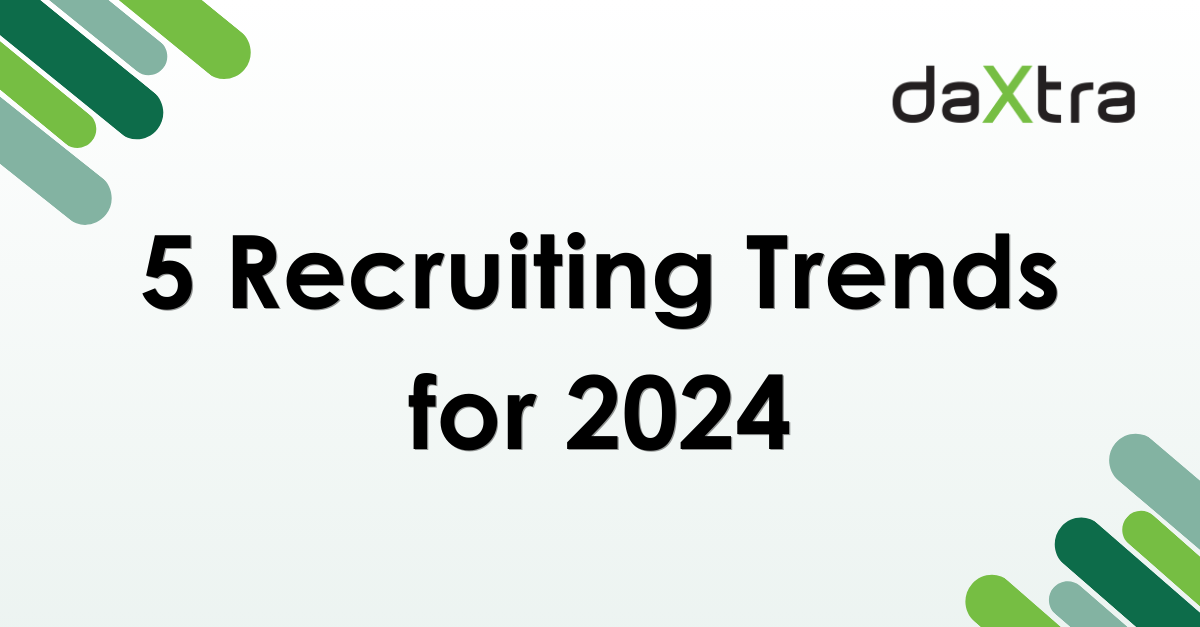Over the last few years, following the onset of a global pandemic and its aftermath, recruitment professionals have been forced to adapt to unprecedented challenges. They’ve dealt with unstable job markets, a scarcity of candidates to fill positions and a scarcity of roles—all in the face of a competitive candidate market. This has resulted in the need for quick adjustments, and recruiters becoming more flexible with their strategies when searching for new ways to find and hire talented individuals.
As recruiters continue to refine their approaches, we will see the industry evolve all the more in 2024. From incorporating AI to more proactive recruitment, we’re taking a look at the ways we think recruiting will advance its thinking, learning and development in the year to come.
Artificial Intelligence
Despite economic uncertainty, we expect investment in AI-powered recruitment technology to continue to rise. AI tools can enable recruiters to enhance their efficiency in ways they couldn't previously achieve. According to a new study by The IBM Institute for Business Value, 87% of executives think AI will enhance employees' abilities rather than replace them. They have coined it ‘The age of the augmented workforce,’ marking a new phase where collaborations between humans and machines yield exponential business value.
Some examples of this might include:
- Predictive AI analytical tools that can help organizations make informed decisions about hiring strategies to reduce time-to-fill
- AI hiring tools that can create a more inclusive hiring process through objective screening and anonymized assessments
- AI-powered search and match to find and engage candidates quickly
- Application of generative AI to enhance the extraction of skills from resumes to assist skills-based hiring
It's no surprise that we predict AI will be a defining factor in 2024 recruiting. It has vast transformative potential for almost every aspect of the sector. As Clara Shih, CEO of AI at Salesforce put it: "Whether you work as a marketer, lawyer, customer support representative, or software engineer, we need to learn how to use AI to fundamentally do our jobs differently.”
Automation
In a survey of recruiting professionals conducted by Net Talent, the majority believed that improving recruiter performance is best achieved by investing in better recruiting technology.
Automation has become essential to modern recruiting, allowing recruiters to screen larger volumes of applicants more easily, reduce errors, and enhance candidate engagement. There’s also a wide range of applications of automation to candidate experience—like speeding up offer letters, simplifying hiring procedures, and improving onboarding. As a result, we’ll likely see recruiting and staffing firms increasingly harness automated tools.
Likewise, as more people capitalize on automation, we will also see a continued focus on prioritizing data quality. Data health is vital to building a robust foundation for any automated tech. If data management and data recording practices are in bad shape, organizations might face inaccurate results or negative outcomes due to low-quality data.
Candidate-Focused Recruitment
We’re predicting that improving candidate experience will continue to be a trend in 2024 as recruiters look for ways to enhance the entire recruitment process to attract the right candidates. Only 32% of candidates rate their most recent job search experience as “very good.”
Providing a positive candidate experience not only reflects well on your employer brand, but it’s also crucial in retaining top talent. Candidate-centered recruitment focuses on cultivating relationships with candidates—rather than just trying to fill available positions quickly.
Today's candidates have higher expectations for communication and feedback during the hiring process. Providing a seamless experience through timely updates, organized scheduling, and user-friendly portals can help recruiters stand out from the competition.
Tailoring each stage of the hiring process to align with the candidate's needs and expectations not only results in a positive candidate journey, but it can also potentially increase the number of high-quality applications and referrals, reduce hiring timelines, and cut down on recruitment expenses.
Increased Personalization
As email providers take steps to crack down on spam, it’s become even clearer that sales and marketing outreach needs to be hyper-targeted and personalized, rather than a broad brush approach of mass mailing with generic messaging.
Customization involves dedicating time to research candidates and their most up-to-date experience so recruiters can personalize outreach. This ensures that the recruiter's outreach is grounded in a careful assessment of the candidate's suitability for a particular role, thereby increasing the chances of attracting the candidate's interest.
Although personalized messaging was big in 2023, we expect to see it continue into 2024. Hyper-personalized messaging can help recruiters keep up to speed in today's competitive job market, and with the abundance of AI tools available, it's becoming easier to stay on track. Not only can you attract top candidates with specific messaging, but it’s also likely to reach passive candidates successfully, too.
Skills-based Hiring
Skilling will continue to be a focus for recruiting in 2024 (especially considering recent industry discussions about redefining the concept of experience). Nearly 80% of recruitment and HR professionals said that poor quality job applications and skills shortages were the biggest challenges they faced when recruiting in the past 12 months.
The phrase "skills-first" has gained popularity, advocating for prioritizing an individual's skills and competencies above traditional factors such as degrees or past job titles. This approach emphasizes the attraction, hiring, and development of talent based on specific abilities and soft skills, like empathy or collaboration.
Skills-based hiring is more holistic, dynamic, and inclusive. Not only is it likely to open up more opportunities for current employees and prospective hires but it’s also an important catalyst in evolving employee value. If considered correctly, skills-based hiring can ease talent shortages, foster innovation, and cultivate a more diverse workforce.
Ultimately skilling also plays into other big trends for the year, like candidate-first hiring experiences and using AI recruiting tools to better identify a wider variety of skills.
The Year Ahead
The recruitment industry is set to see continued momentum in 2024, with AI, automation, and candidate experience taking a front-row seat. As recruiters work to address new challenges and implement new tools, they’ll continue to innovate and find ways to source, connect with, and hire top talent quickly and successfully.
At Daxtra, we aim to empower recruiters to do just that. We specialize in intelligent recruitment automation, AI-powered search and match, and multilingual resume and job parsing in 40+ languages. Built on AI and machine learning, our technology seamlessly integrates with recruitment tech stacks, like an ATS or CRM.
To learn more about how our solutions can help, check out our products or request a demo for more information.



